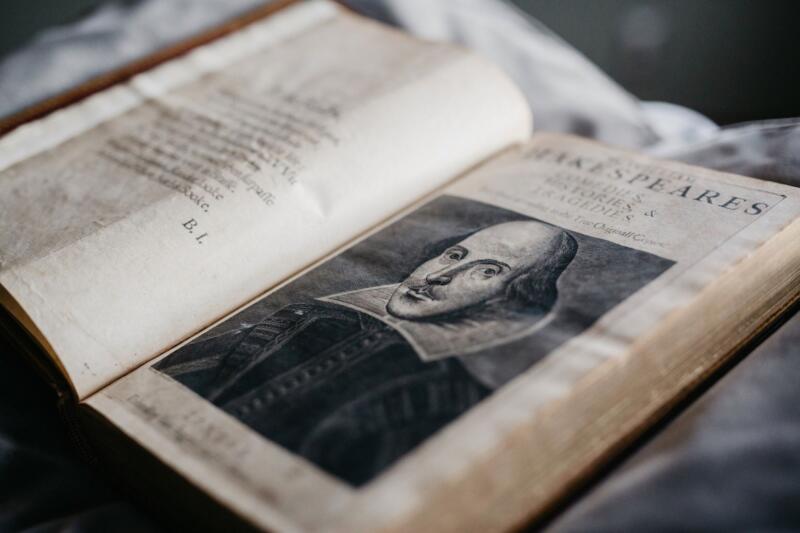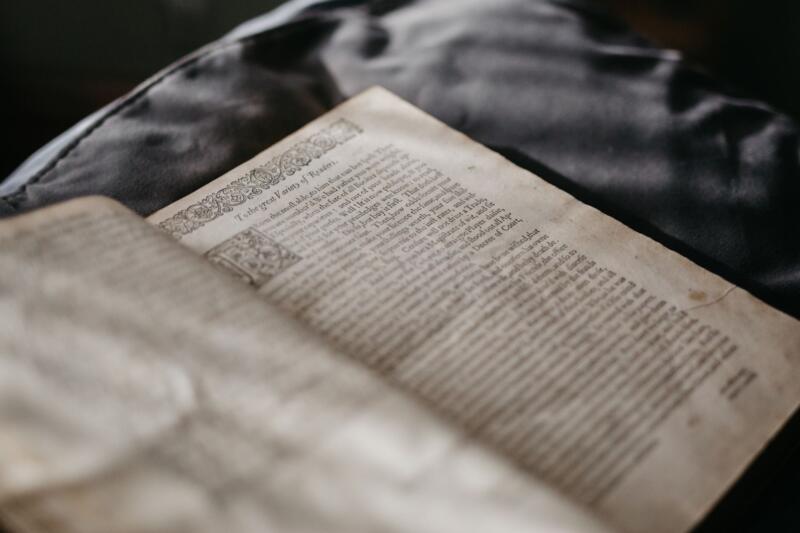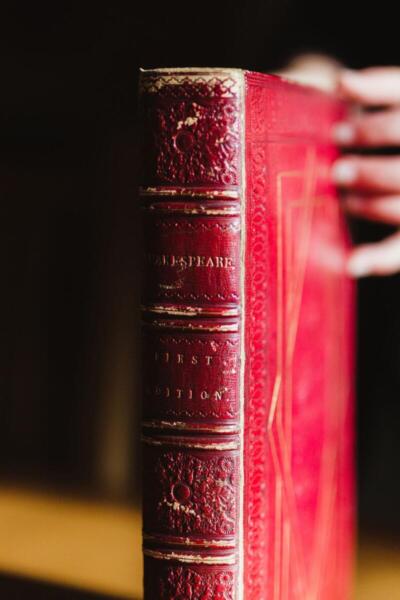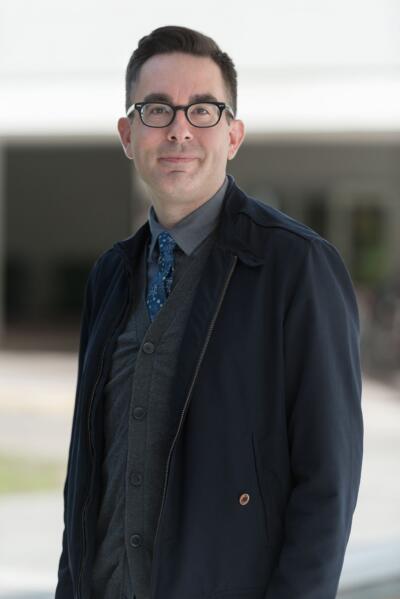1357 My kingdom for a … First Folio
Editor’s note: in January 2022, the University of British Columbia announced the acquisition of a rare copy of the first edition of the collected plays of William Shakespeare, known to scholars as the First Folio, published in 1623. One of 235 copies in existence, UBC’s copy is only the second in Canada, the other being at a university in Ontario.
We talked recently to Gregory Mackie about this gift. Mackie — no relation to the editor — is Associate Professor, Department of English Language and Literatures, and Norman Colbeck Curator, UBC Library Rare Books and Special Collections.
Our conversation is below – Richard Mackie
*
The Ormsby Review: Acquiring this Folio will tie Canada with France for fifth place among countries with the book (each with 2 copies). But BC seems an unlikely place for scholars to come to study Shakespeare, when there are 150 copies in the USA (and perhaps almost half of those in the Folger Shakespeare Library in Washington DC) over 50 in the UK and 15 in Japan. Australia, New Zealand, and South Africa each own a copy. So why is it important to have this First Folio in BC?

Gregory Mackie: There are many reasons people study Shakespeare, and many audiences for his work. At UBC Library’s Rare Books and Special Collections (RBSC), we don’t pretend to be another version of the Folger Shakespeare Library (Washington DC) or the British Library (London). We are also geographically distant from those places. One of the main inspirations for this acquisition has been to address the access gap faced by residents of BC to items such as the Folio. Cultural properties with the historical and aesthetic magnitude of the Folio are distributed very inequitably around the world, as your question implies. There is only one copy in Canada, and that’s at the University of Toronto. Having a Folio at UBC will enable access to the book — and the conversations it catalyzes — for a great many people who otherwise would never have had the chance to see it. This is about democratizing access, and about bringing an extraordinary piece of the world’s cultural heritage into public ownership. (The book was previously owned by a private collector in New York whose identity remains unknown to us). We take this mandate very seriously, which is why we are also pursuing a robust digitization program involving 3D photogrammetry to make Shakespeare accessible to new audiences in new and exciting ways.
The Ormsby Review: UBC’s First Folio was acquired for an undisclosed sum after seven months of fundraising. Are you able to name or thank any of the individual or institutional donors?
Gregory Mackie: I am eternally grateful to the international consortium of donors who made this possible. The Government of Canada, through the Department of Canadian Heritage, also contributed. As for the price, I am bound to keep that information confidential. In private sales such as this one (brokered by Christie’s), such conditions are routine. I will say, however, that the price realized on this copy certainly did not set any records, and that its acquisition did not take up funds that could have been put to another use. This was never a zero-sum proposition that will deprive students or anybody else. The Folio at UBC is about “both/and,” not “either/or.”

The Ormsby Review: Surely it is possible to access Mr. William Shakespeare’s Comedies, histories & tragedies, published according to the true originall copies (London: Isaac Jaggard and Edward Blount, 1623) in facsimile edition on the internet these days?

Gregory Mackie: Of course it is. But digital facsimiles can never capture the talismanic magic, the real power, of the actual book itself. Books like the Folio will have the capacity to engender wonder in students for the next 400 years and beyond, and that’s what we want to enable. Every copy of the Folio is unique, and tells its own story: a story of who read, owned, interacted with, treasured, repaired, sold, soiled, and even neglected it. This copy contains a fascinating archive of information related to its provenance, which we can trace back to the eighteenth century. Indeed, this copy has been associated with writers for hundreds of years. One leaf was supplied from another (dismembered) copy of the Second Folio, and according to legend that book had been owned by Samuel Johnson, the eighteenth-century lexicographer and literary critic. Those kinds of tangible and unique historical connections are not even remotely palpable on the internet.
The Ormsby Review: It has been said that the First Folio has become the book through which we recognize and understand Shakespeare. There are about 235 extant copies. How will this one help us to better recognize Shakespeare?
Gregory Mackie: The Folio is important for many reasons, but one of the main ones is that nearly half of Shakespeare’s plays, which remained unpublished at his death, would have been lost to history without it. One of our partners on the exhibition at the Vancouver Art Gallery is Bard on the Beach, Vancouver’s Shakespeare Festival. We look forward to working with them to engage their audiences in recognizing Shakespeare – on the page as well as on the stage – as we approach the Folio’s 400th anniversary in 2023.


The Ormsby Review: Who will actually be able to read or make use of this book? Will measures will be taken to allow public access? Will digital viewing of the whole folio be possible, and will viewing be free?
Gregory Mackie: In short, yes! At present my colleagues Katherine Kalsbeek, Head of UBC Library’s Rare Books and Special Collections, and Chelsea Shriver, UBC Rare Books Librarian, are consulting with other institutions that hold First Folios on developing special protocols to ensure both access to, and preservation of, this book. Advance arrangements with RBSC will need to be made to consult the book directly, and we will also ensure security for the volume. The 3D photogrammetry that I mentioned earlier will enable members of the public to “turn the pages” of the book, digitally. All of this will be freely available to the public. That’s our mandate.
The Ormsby Review: When the Dallas Public Library acquired its First Folio, they built a unique room in which to house the Folio, featuring panelling, furnishings and furniture from 17th century England. Will we be doing anything similar?
Gregory Mackie: [Laughing]. I don’t think that UBC Library has the resources for such a set-up, although if a generous donor comes along with innovative ideas (and funds) for ensuring preservation and access, I’m certainly be interested in having those conversations.

The Ormsby Review: Was it necessary to put any special security, humidity, or light arrangements in place to ensure the longevity of this acquisition?
Gregory Mackie: The Folio will be stored in UBC Library’s climate-controlled vault, where humidity, light and security will be closely managed in perpetuity.
The Ormsby Review: Perhaps UBC could invite Emma Smith – author of Shakespeare’s First Folio: Four Centuries of an Iconic Book (Oxford University Press, 2016) — to the Vancouver Institute to talk about her biography of the First Folio — or are there plans for various symposia tied to the acquisition?

Gregory Mackie: As it happens I am speaking at the Vancouver Institute on January 29th, but about my own research (on forgeries of Oscar Wilde). That said, I have read and enjoyed Emma Smith’s marvellous book, and it would be wonderful to have her in Vancouver! We are planning on a symposium to mark the book’s 400th anniversary in 2023, but as I hope the readers will understand, all of that is still in the planning stages.
The Ormsby Review: Recently we reviewed Sonnet’s Shakespeare by Sonnet L’Abbé of Vancouver Island University. Our reviewer asked, “‘What’s in a name?’ Is Shakespeare the transcendent voice of Western culture or a symbol of colonization? Sonnet L’Abbé … aims to erase Shakespeare’s colonial power by rewriting his 154 sonnets with a revised focus aimed at deliberate decolonization.” L’Abbé addresses Shakespeare’s sonnets, not his plays, but is this acquisition more than a triumphant regional affirmation of colonial literary values?
Gregory Mackie: Far from it. As I mentioned above, this acquisition is prompted by decolonial impulses: Shakespeare’s words are the common inheritance of every reader and playgoer who operates in the English language. I borrow this idea from W. E. B. DuBois, who was hardly a cheerleader for racism or imperialism! This is for the many, not the few. We are keenly aware of Shakespeare’s uptake in the history of imperialism and colonialism, which is why one of our key advisors has been Dr. Linc Kesler, an Indigenous Shakespeare scholar who is the former UBC Presidential advisor on Indigenous affairs. He spoke at the announcement on January 12th, and has some fascinating things to say about the relationship between oral and written cultures that the Folio bridges.
The Ormsby Review: The acquisition has drawn some irate comments on the CBC Vancouver website, for example, “In my mind the function of a university is to educate, not to accumulate treasures.” “I wonder how many scholarships or grad student stipends this price ‘that won’t be disclosed’ could have supported.” “For all that it does for education, this ‘acquisition’ is no better than a gaudy bauble.” How would you respond to this?

Gregory Mackie: Well, you can’t please everybody! Such comments misunderstand (perhaps deliberately?) what having a First Folio is all about. That first one, for instance, relies on a very narrow and ill-informed understanding of what “education” and the “function of a university” might entail. As I said before, UBC did not go out to spend a great deal of money on this book at the expense of grad student stipends, or anything else. We are committed to enriching experiences not only for students, but also for the citizens of British Columbia, not impoverishing them.
The Ormsby Review: How is Shakespeare still relevant? Many words and phrases in the English language were first used or recorded in the First Folio, but is there more? Is there an easy way to gauge his importance to language and culture? Are Shakespeare courses popular at UBC?
Gregory Mackie: Our Shakespeare courses are always fully enrolled. There is no easy way to gauge his importance and relevance, but here we are talking about him, 399 years after the publication of the First Folio…
The Ormsby Review: Are there any wine glass rings on UBC’s copy of the First Folio as there apparently are on some of the others?
Gregory Mackie: Alas, there are no wine-rings (or lists, or doodles, or burn marks). This copy is in remarkably good condition. There are a few marginal markings, but the text block is in great shape and the book wears its 400 years astonishingly well.
The Ormsby Review: Thank you for this, Greg!
*
The Ormsby Review. More Books. More Reviews. More Often.
Publisher and Editor: Richard Mackie
The Ormsby Review is a journal service for in-depth coverage of BC books and authors in all fields and genres. The Advisory Board consists of Jean Barman, Wade Davis, Robin Fisher, Cole Harris, Hugh Johnston, Kathy Mezei, Patricia Roy, Maria Tippett, and Graeme Wynn. Scholarly Patron: SFU Graduate Liberal Studies. Honorary Patron: Yosef Wosk. Provincial Government Patron since September 2018: Creative BC
“Only connect.” – E.M. Forster
One comment on “1357 My kingdom for a … First Folio”
Very interesting! You might like the following short study showing thanks to 1603 Van Mander’s painting ”The Chess Players” showing Jonson and Shakespeare playing chess, that the Sanders painting, the Harvey miniature as well as the unloved Chandos painting are all genuine portrait of The Bard.
https://issuu.com/doucetjp/docs/van_mander_shakespeare_sitter_scar